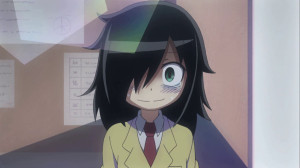The Strange Case of Home Behaving Badly
by RadiumEyes, HSM team writer
Inari, Konkon, Koi Inori, an anime that debuted January this year, focuses on Fushimi Inari, a high school student who inadvertently receives powers from the kami representation of her namesake; thanks to Uka-sama, Inari the student can transform herself into any person she wishes. The prospect of the henshin (“transformation” in Japanese) can be very enticing: imagine being able to change your appearance at will, and what attendant opportunities that can bring. The idea of metamorphosis in fiction goes back centuries; shape-shifting can be found in classic literature such as Beauty and the Beast, as well as in Greek mythology – Zeus himself had a habit of it when pursuing love interests, after all. Modern examples include Beast Boy (a core member of the Teen Titans) and Clayface (a perennial Batman villain), along with the protagonist of the aforementioned anime; altering one’s appearance became a staple of fiction, and one can doubtlessly find other examples of the power in literature, film and video games.
But what can it say about the nature of identity, especially on a large-scale social network? The Internet provides us with a great template to present ourselves to a global audience, and with that comes the temptation to behave in numerous ways; we inadvertently developed a global network that encapsulates the famous maxim found in Spider-Man, “with great power comes great responsibility.” In the case of cross-cultural interaction, that power happens to be social graces; it’s not a superpower, but no less important to society.
PlayStation Home, for example, thrives on social communication. It allows users to dress up however they want, with a wide array of wardrobe choices ranging from the more practical (such as Drey) to the fanciful or even bizarre (such as a gorilla suit or a military vehicle). Such a fascinating display of fantasy play appeals to the child in all of us – we can make real, in the digital realm, all those dreams of playing superhero or Godzilla, with a mass audience joining in on the fun.
At the same time, however, there comes with it an explicit code of conduct. The EULA outlines what we agree to as users of Home, and our use of the application can be rescinded if we violate that agreement through bad behavior. People probably have their own stories of seeing people get banned for all sorts of actions – this underscores the importance of the EULA, even if you don’t necessarily agree with all its provisions. Whatever your philosophy is regarding Home, the point remains; you made a personal contract to behave yourself on Home, and agreeing to the terms of the EULA ostensibly marks this contract.
Of course, this doesn’t physically prevent anyone from acting up – drama still occurs, and trolls can find a way to irritate you and otherwise ruin your mood. What makes this possible, unfortunately, is the same thing that makes Home such a great service; you exist simultaneously as a human being and an avatar, and the uncertainty of knowing exactly who you may speak with at any given moment becomes a struggle for anyone wishing to have a pleasant experience. For those of us who experience anxiety or depression, this hurdle becomes all the more pronounced; peace and tranquility can be very difficult to come by in a public space, if someone approaches you and proceeds to act in an unbecoming manner.
It reminds me of the duality of humanity that Robert Louis Stevenson examined in The Strange Case of Dr. Jekyll and Mr. Hyde. He wrote the novella during a time when psychology was in its infancy, and philosophical musings on the human identity rested on the Victorian concept of the inner turmoil of “good versus evil.” Someone could dramatically change from Jekyll to Hyde from one moment to the next, seemingly without provocation; in Jekyll’s case, he drank a mysterious concoction that forced the transformation, which led ultimately to his demise (in the guise of Hyde).
Today, the dichotomy of “good versus bad” remains a strong topic of debate, but the Victorian view of this duality gave way to a more complex rumination on human nature. The Internet provides us with a great example of how complicated the subject can be – with the ability to change your appearance on a whim (provided you have the necessary components to do so) brings about the complications of who you are as a person. Who you are as a person in the real world may differ greatly from how one presents oneself on a digital network – the supposed anonymity of such places as Home can bring out the awkward in us, to say the least. The metamorphosis becomes one of digital wandering on places like Home; you don’t have to make your avatar look like yourself, but people extend that idea to an absurdity, behaving in ways they would likely not engage in in real life. The literal, physical transformation (i.e., the changing of one’s avatar) thus becomes a symbol of the concomitant change in our behavior; when we feel we can get away with it, we can act up and frustrate others without fear of immediate consequence.
But there’s always a way to confront such bad behavior – even if the moderators don’t seem to have a major presence like they once did, users can take the initiative and simply ignore those who act badly around us. Trolls feed on the irritation they cause, but denying them the pleasure can cause them to rethink their actions; not descending to their level, and keeping a level and sober head, can be rather trying, but it ultimately pays off. As an anxiety sufferer, I do find it difficult to deal with trolls, and try to avoid public spaces when I can; I feel most comfortable when I’m by myself or around a group of close friends. Understanding this about myself helps me, though; I can find places where I can relax, and if something arises, there’s always a personal apartment to go home to. But what about dealing with a stressful situation as it comes? Speaking personally, I sincerely want others to understand that Home became a place of comfort for me; I have great difficulty functioning in society as it is, and I don’t want to see Home become another source of anxiety.
After I wrote my “Anxiety in Home” article, I received a lot of positive feedback from people who go through the same troubles as I do; that was a great honor for me, as it shows that people are willing to connect with what I wrote. This may very well be a spiritual follow-up article to that – for those that enjoyed my article, you have my sincerest gratitude. The world can be a scary place, but knowing that there are others suffering from anxiety helps me understand that I’m not alone; being able to manage one’s depression and anxiety can be troublesome, especially with something as harrowing as Home, but rest assured that it can be achieved. Seeing people act rudely and brashly does discourage me from entering public spaces – I’m not one for confrontations, and seeing some means of ensuring a safer environment would be a great service indeed. Perhaps Home became so large that more moderators would help greatly; as it stands, it’s an enormous, daunting place, and navigating Home will be treacherous with the trolls about. Yet, I hold on to my optimism – there are friends who sincerely are kind, no matter what their avatar looks like, and that’s a beacon of light in the darkness.
Share
| Tweet |





 Twitter
Twitter
This is a refreshing article to read, as I’ve contemplated on the strange behavior found in Home. It’s strange to me when I find such said behavior lain in the MMO mostly because many disparage the “common” sense on morality.
We desire respect, peace, and just a good time. How is it that hard to conduct proper moral and follow the guidelines in a virtual construct is beyond me but a lot like to go beyond to make a career out of telling others that they lack a life, or you’re some bundle of wooden sticks because your avatar’s gender is the opposite of who you are in real life.
These fixed notions, along with the genetic and passive fallacies, are some of the prime reasons why my traverses into the public spaces are quite rare these days. As the bad behavior is seemingly thicker and thicker, as longs you’re around good people, it seems to become quite irrelevant. Good people bring in good quality and more people that adheres to positive minds.
And if this brings out a long drawn response like this, that means it’s a dang good article. Very well stated, Radium.
I think we place too much on the home community, if you look at the community is so fragmented that actually the home community really doesn’t exist. We are told it does in so many places but it’s illusive, hidden, hiding out in little pockets of friends, over different web sites and social media applications. How anyone expects home to be different than any other MMO which all have they issues with exactly what’s mentioned in the article, its not high and mighty, it doesn’t have the great community, its a MMO warts and all. Why expect it to be better.